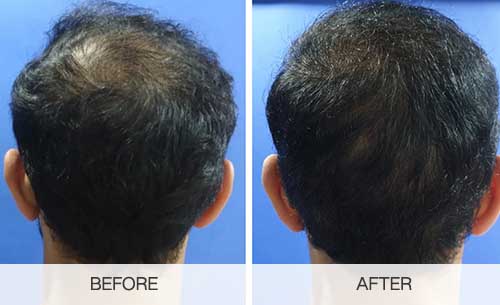- Home
- About Us
- Hair Transplant
- Hair Loss
- Medical Treatment
- Patients Gallery
- Our Patients
- Blog
- Contact Us
- Hair Transplant Cost
- Book an Appointment
- Brochure

Hair transplant is a minimally invasive procedure with higher success rates and quicker recovery. If you expect to experience a head full of hair right after the treatment, you are likely in the dark. So, instead of falling down the wormhole of false expectations, it is better than you familiarize yourself with the procedure and hair transplant recovery.
To ensure good recovery and healthy regrowth of your transplanted hair, it is essential that you follow all the post-operative instructions. If you aren’t completely aware of the hair transplant recovery time and aftercare instructions, we hope to answer all of your queries with ease.
Feel free to skip ahead if one topic catches your eye
Since the hair transplant is done as an outpatient procedure, it is likely that you will be discharged right after the treatment, once the effect of anesthesia wears off. The patient is often advised to have someone to accompany them way back home to avoid any risks.
The patient might experience swelling, numbness, and pain right after the treatment. The doctor will prescribe the required medications for all these shortcomings to ensure quick recovery and pain relief.
The doctor also suggests avoiding strenuous and heavy-duty work for a few days to avoid putting excess strain on the treated area on the scalp. The list of strenuous workouts includes heavy-lifting, bending down and even walking for at least 2-3 days after the treatment.
The transplanted area on the scalp is often covered in bandages and the patients need to keep it covered for a few days to avoid the risks of infection. Your doctor will instruct you about the bandage dressing that you can follow for fut or fue hair transplant recovery.
The patient is instructed not to wash their hair right after the treatment. Instead they need to wash their hair 3-4 days after the procedure with a mild shampoo and with gentle motions not irritating the site of the transplant. Make sure that you pour water multiple times after shampooing to get rid of any remnants. Once done, dab the excess moisture from the scalp using paper towels.
They also need to avoid taking medications like aspirin for a few days. Even blowing your nose too hard is risky and might end up causing bleeding at the wound sites.
For sleeping, try and sleep at an elevated angle of 45 degrees for optimal comfort. Avoid sleeping on the side of the transplant or put excess pressure on the transplanted site.
The majority of the patients do get back to work within 2-3 days after the surgery, provided that they follow all the necessary safety protocols. But, if you have the means to take a few days off for recovery, we’d suggest you do that, instead of rushing into work.
The first two weeks after the hair transplant are extremely crucial because it takes the implanted grafts around two weeks to secure themselves on the site of the transplant. The first two weeks are also the time frame when the scalp heals itself.
Since the first 7-14 days is the peak time in the hair transplant recovery, the patient needs to be extremely careful of taking care of their implanted grafts to prevent risks of infection or other issues. Avoid getting dirt, dust, or even sweat accumulation on the scalp because that can result in infections.
Swelling in the transplanted area is also very common in the first week to 10 days. The doctor will likely prescribe you some anti-inflammatory drugs to relieve the pain and swelling. You can also apply an ice compress to further relieve the pain and ensure quicker donor area recovery after transplant. Apply the ice compress for 10-15 minutes every 2-3 hours.
The first month after the surgery is when you might start seeing results. Patients can expect to see the regenerated growth of the transplanted hair from the surface of the scalp. But, the growth of the new hair after transplantation varies and can even take up to 3 months.
The new hair that grows from the transplanted site will not come out evenly and might grow in spurts haphazardly . The hair growth might be very thin and fine, but gets thicker and healthy gradually. During the first month, you might notice scabs on the site of the transplant and it is completely normal, so there is nothing to be worried about.
Some patients might witness ingrown hair on the transplanted site. However, it is temporary and signifies positive signs of hair regrowth. Avoid taking showers for at least a month after the surgery. Even after a month, the doctor advises taking gentle showers with low pressure instead of a heavy stream.

The FUE hair transplant recovery process is tedious, especially when it comes to the results. While some patients start seeing hair regrowth from the transplanted site after a month, it might take up to 3-6 months in others.
You can also start getting normal hair cuts with scissors after the third month. But, ensure that you avoid using razors on the scalp for at least six months.
The third month is when you start seeing signs of success rates. Most of the patients report seeing 1cm growth of hair per month, which might not seem like a lot but is quite credible after the cosmetic hair restoration.
You need to be vigilant about the progress of the hair regrowth during the second or third month and keep a record of the growth too. Moreover, you need to schedule a follow-up treatment during the third month as well. For “before and after” records, the doctor would likely suggest taking pictures of the changes on the transplanted site. This also helps act as a visual reference for the doctor to check during the follow-ups.
In case you witness something off about the site of the treatment, note them down and set up an appointment with your doctor to get all the queries clarified.
Once you have crossed the third-month mark into the hair transplant recovery, it is likely that you will start noticing gradual progress with the results. If you witness your hair fall out after the third month, it is a normal thing to happen.
The complete healing and recovery take somewhere between 6-12 months. After the first six months, you can start witnessing substantial growth of new hair. But, it is during the 8-10 months time that you see the most promising results, noticing the hair regrowing with greater density.
Once new hair starts growing from the transplanted sites, there is no going back. But, the patients need to realize that much like the actual hair follicles, even the transplanted ones come with a limited life span and are subject to damage over time. This is one of the reasons why several doctors suggest getting touch-ups every few years after the initial hair transplant.
Hair transplant is gaining rapid popularity, especially due to the higher success rates and the introduction of new advancements. While the doctor takes care of the actual procedure, the hair transplant recovery depends on the patient as well. Make sure that you follow the post-op instructions to ensure a quick recovery and substantial regrowth of the hair from the transplanted site.
At Medlinks, you will get the best hair transplant in india with the latest techniques (such as Perfect-I) at affordable costs with detailed post-operative instructions and aftercare.

Dr. Gaurang Krishna

Copyright © 2025 Medlinks. All Rights Reserved.
Disclaimer:The content published on this website(hairtransplantdelhi.org) is meant to spread awareness and educate the concerned patients regarding baldness and hair transplants as well as the treatment options available for baldness and hair transplant treatment in Delhi India. Any information on the website shall not be regarded as a prescription from a professional dermatologist. We recommend visiting a dermatologist in person for the right diagnosis and the treatment for any hair issues. We do not guarantee specific results as the treatments and the results vary from person to person.